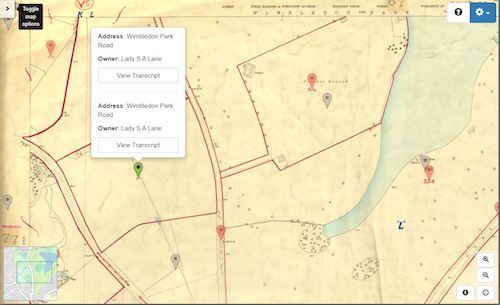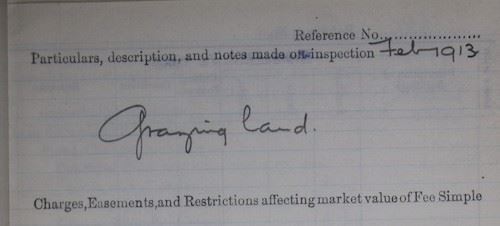The following announcement was written by TheGenealogist:
Fascinating English land tax records from the years before the First World War are being released today by TheGenealogist. Researchers are now able to search 31,394 newly added records of owners and occupiers to discover their ancestors from Merton, Mitcham, Morden and the Wimbledon areas.
Each record is linked to clear scanned pages of the actual IR58 Field books, sourced from The National Archives, and the properties plotted onto large scale contemporary IR121 maps. These maps are digital copies of the ones used at the time by the Valuation Office of the Board of the Inland Revenue to locate each and every parcel of land in the survey taken in between 1910 and 1915. TheGenealogist’s versatile Map Explorer™ allows their Diamond subscribers to view georeferenced modern and historical layers beneath the IR121 recordset map and so discover how the roads, fields and general environment has changed over the years.

Grazing land that would become the site of the Centre Court at Wimbledon in the following years
House historians and family history researchers alike will appreciate the ability to unearth valuable particulars about ancestors’ homes and land from these areas of south west London. They will also be able to see how similar, or even how very different the area where their ancestors lived had been at this time when compared to the map of the area today.
Included in those records being made available today is the past and present home of the iconic tennis tournament known as the Wimbledon Championship. The researcher is able to discover that the present day Centre Court, home to the only Grand Slam tennis event still to be held on grass, had in 1910 been rural fields put to use as “Grazing Land” by its owner Lady Sarah Lane.

The All England Lawn Tennis and Croquet Club, at the time of the survey, was then squeezed into a much smaller area of land in Wimbledon than it is today. That plot, where once the Championship played out, still plays a part in sport today albeit at a much lower level of competition.
Read TheGenealogist’s article: From Grazing Land to the Grass of Centre Court
https://www.thegenealogist.co.uk/featuredarticles/2022/wimbledon-from-grazing-land-to-the-grass-of-centre-court-1534/
About TheGenealogist
TheGenealogist is an award-winning online family history website, who put a wealth of information at the fingertips of family historians. Their approach is to bring hard to use physical records to life online with easy to use interfaces such as their Tithe and newly released Lloyd George Domesday collections.
TheGenealogist’s innovative SmartSearch technology links records together to help you find your ancestors more easily. TheGenealogist is one of the leading providers of online family history records. Along with the standard Birth, Marriage, Death and Census records, they also have significant collections of Parish and Nonconformist records, PCC Will Records, Irish Records, Military records, Occupations, Newspaper record collections amongst many others.
TheGenealogist uses the latest technology to help you bring your family history to life. Use TheGenealogist to find your ancestors today!
 Latest News Articles
Latest News Articles Do you have an RSS newsreader? You may prefer to use this newsletter's RSS feed at:
Do you have an RSS newsreader? You may prefer to use this newsletter's RSS feed at: